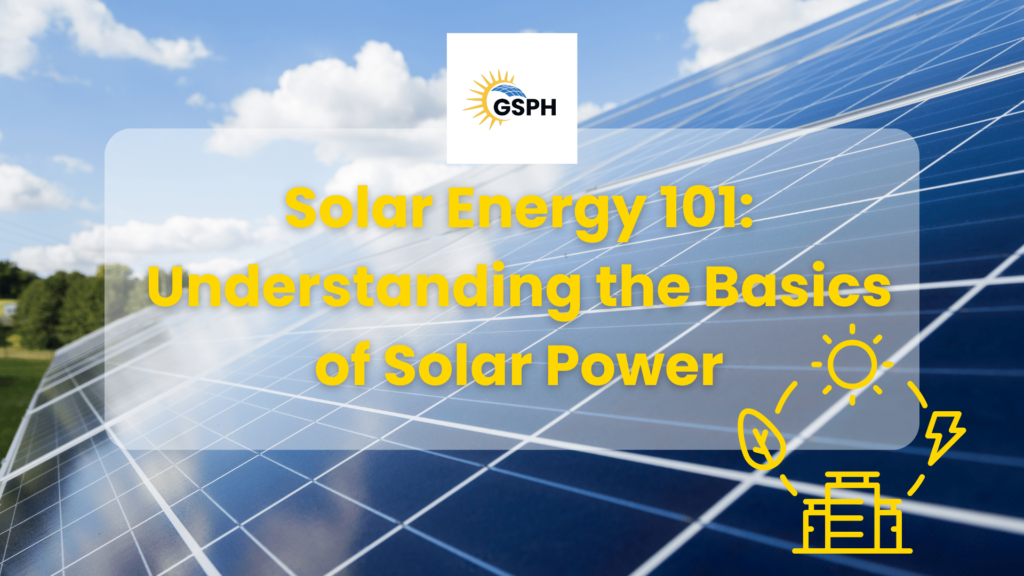
Introduction:
A clean and sustainable energy alternative, solar energy is a plentiful and renewable source of power. Solar energy, which harnesses the power of the sun, has a number of advantages, including a reduction in the need for conventional energy sources and a reduction in carbon emissions. We will examine the fundamentals of solar energy in this post so that you may comprehend how it operates, what makes up it, and how it has the potential to revolutionise the way we produce electricity.
Solar panels are used to turn sunlight into electricity, which is how solar energy operates. Photovoltaic (PV) cells, which are formed of semiconductor materials like silicon, are the building blocks of solar panels. These cells produce an electric current when sunlight strikes them, which is done by igniting the material’s electrons. An inverter converts this direct current (DC) into alternating current (AC), which is compatible with home equipment and the electrical grid.
Components of a solar panel include several essential parts, including:
a.Photovoltaic (PV) Cells are the fundamental components of solar panels, absorbing light to produce electricity.
b. Encapsulation: PV cells are covered in a transparent, glass-based encapsulation that shields them from the elements while permitting light to pass through.
c. Frame: The frame gives the solar panel structural support and serves to shield it from impact and mechanical stress.
d. Wiring: The PV cells are connected by electrical wiring, which also directs the electricity produced from the panel to the inverter.
e. Inverter: This device transforms the DC electricity generated by solar panels into AC electricity that can be utilised to run home appliances or fed back into the power grid.
Grid-tied and off-grid systems are the two basic subtypes of solar energy systems.
Grid-Tied Systems: These systems are wired into the power grid. Through a procedure known as net metering, excess electricity produced by the solar panels can be transmitted back to the grid, enabling homeowners to get credit or payment for the power they contribute. Grid-tied systems reduce reliance on the grid while offering a dependable and practical energy source.
Off-grid systems are those that are not connected to the electrical grid and often use batteries to store energy. These systems are frequently utilised in isolated locations where it is impractical or expensive to connect to the grid. Off-grid solutions offer self-sufficiency and can be used in conjunction with backup generators to ensure a steady supply of electricity.
Solar energy has a number of advantages for households and the environment, including:
a.Solar energy is a clean, sustainable form of energy as opposed to fossil fuels, which are responsible for climate change and air pollution. Since the sun’s energy is practically limitless, future generations will have a reliable source of energy.
b. Financial savings: You can save a lot of money by producing your own electricity and lowering your energy costs. Solar systems can offer long-term cost savings and protection against escalating energy costs with careful planning and installation.
c. Environmental Impact: Using solar energy results in zero emissions of greenhouse gases or air pollutants, lowering carbon footprints and preventing climate change. Additionally, it protects water resources because, unlike traditional power plants, solar power generation doesn’t use a lot of water.
d. Energy Independence: Solar energy helps homes to enjoy energy independence by reducing their reliance on conventional energy sources. Solar energy systems can deliver dependable electricity even during grid disruptions with the use of energy storage options like batteries.
e. Higher Property Value: It has been demonstrated that solar systems raise property values, luring environmentally aware buyers who appreciate the long-term advantages and possible cost savings of solar.
Conclusion
Solar energy is a strong and long-lasting solution that has the ability to completely change how we produce electricity. Solar power provides several advantages for homeowners, companies, and the environment by capturing the sun’s rays and transforming them into clean, renewable energy. Solar energy not only lowers costs through lower energy bills, but it also encourages energy independence, raises property values, and lessens dependency on conventional energy sources. Additionally, solar energy is essential for lowering carbon emissions, preventing climate change, and protecting limited water supplies. Adopting solar energy is a crucial step as we work towards a more sustainable future to leave the earth cleaner and greener for future generations.
Join the solar revolution to power your homes and businesses while helping the environment by taking use of this abundant and eco-friendly energy source.
Are you ready to take control of your energy future? Discover the incredible benefits of solar energy and make a positive impact on the environment and your wallet.At Goa Solar Power House, we’re committed to bringing clean, renewable energy to your doorstep. You can contact us(click here) and our team of solar experts is ready to guide you on your journey towards energy independence.
